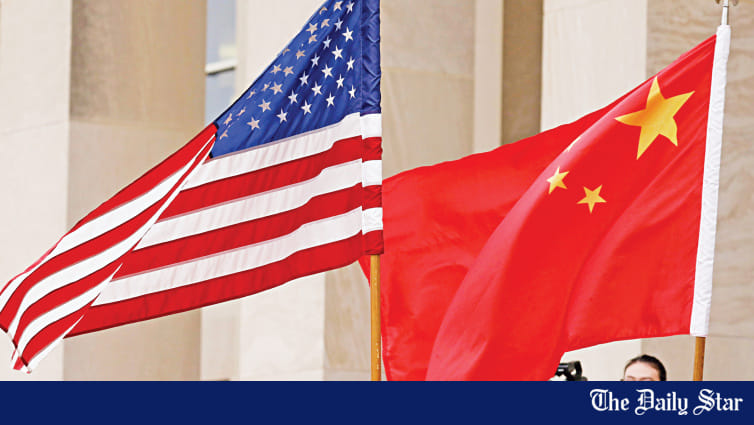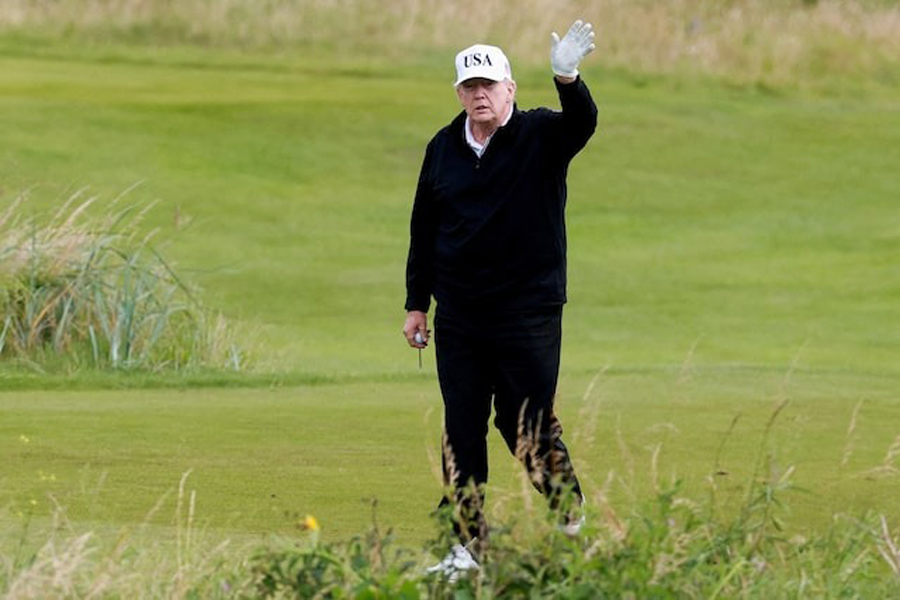Saif
Senior Member
- Messages
- 14,830
- Reaction score
- 7,674
- Origin

- Residence

- Axis Group

Date of Event:
Feb 4, 2025
EU vows retaliation if Trump starts trade war
Agence France-Presse . Brussels, Belgium 03 February, 2025, 22:52

NATO secretary general Mark Rutte (C) speaks with French president Emmanuel Macron (CR) during an informal EU leaders’ retreat at the Palais d’Egmont in Brussels on Monday. | AFP photo
EU leaders meeting in Brussels Monday warned there would be no winners in a trade war with the United States, insisting they would hit back if US president Donald Trump imposes tariffs.
French president Emmanuel Macron said the European Union must show its muscle if US president Donald Trump makes good on his threat to target the bloc with a volley of tariffs.
‘If we are attacked in terms of trade, Europe—as a true power—will have to stand up for itself,’ Macron said.
The leaders of the EU’s 27 nations were huddling in the Belgian capital with Britain’s prime minister and the head of NATO to discuss efforts to boost Europe’s defences faced with an aggressive Russia—as Trump’s demands that American allies spend much more. But the discussions were overshadowed by the US leader’s decision to slap tariffs on Canada, Mexico and China—with Trump threatening to target EU next.
Poland’s prime minister Donald Tusk, whose country currently holds the EU presidency, said everything must be done to avoid a ‘totally unnecessary and stupid’ trade war.
Trump has not hidden his enmity for the EU, accusing it of treating the United States ‘very, very unfairly’ on trade.
After slapping levies on his North American neighbours and China, Trump doubled down on Sunday by saying he ‘definitely’ planned to target the EU in future.
German chancellor Olaf Scholz said a trade dispute would be ‘bad for the US, bad for Europe’, with transatlantic ‘cooperation’ preferable for both sides.
‘We can also react,’ he added, veering from Germany’s traditionally cautious approach to transatlantic trade relations.
‘We need America, and America needs us as well,’ echoed the EU’s top diplomat, Kaja Kallas, adding there were ‘no winners in trade wars’.
On Sunday, the European Commission said it would retaliate ‘firmly’ if Trump hit it and decried his sweeping measures against Canada, Mexico and China.
‘Tariffs create unnecessary economic disruption and drive inflation. They are hurtful to all sides,’ a commission spokesman said.
Up until then Brussels had said it hoped to avoid a trade conflict with Trump through negotiation.
Later European Council chief Antonio Costa held a night phone call with Canadian Prime Minister Justin Trudeau.
‘Both leaders underscored the importance of the EU-Canada bilateral relationship and confirmed their determination to continue to working together,’ an EU official said.
Since Trump was re-elected in November, Brussels has been working to diversify its trading partnerships, announcing in recent weeks both a strengthened trade deal with Mexico and the resumption of talks on a free trade deal with Malaysia.
Back in 2018, during his first term, Trump imposed tariffs on European steel and aluminium exports—leading the EU to respond with its own higher duties.
Agence France-Presse . Brussels, Belgium 03 February, 2025, 22:52
NATO secretary general Mark Rutte (C) speaks with French president Emmanuel Macron (CR) during an informal EU leaders’ retreat at the Palais d’Egmont in Brussels on Monday. | AFP photo
EU leaders meeting in Brussels Monday warned there would be no winners in a trade war with the United States, insisting they would hit back if US president Donald Trump imposes tariffs.
French president Emmanuel Macron said the European Union must show its muscle if US president Donald Trump makes good on his threat to target the bloc with a volley of tariffs.
‘If we are attacked in terms of trade, Europe—as a true power—will have to stand up for itself,’ Macron said.
The leaders of the EU’s 27 nations were huddling in the Belgian capital with Britain’s prime minister and the head of NATO to discuss efforts to boost Europe’s defences faced with an aggressive Russia—as Trump’s demands that American allies spend much more. But the discussions were overshadowed by the US leader’s decision to slap tariffs on Canada, Mexico and China—with Trump threatening to target EU next.
Poland’s prime minister Donald Tusk, whose country currently holds the EU presidency, said everything must be done to avoid a ‘totally unnecessary and stupid’ trade war.
Trump has not hidden his enmity for the EU, accusing it of treating the United States ‘very, very unfairly’ on trade.
After slapping levies on his North American neighbours and China, Trump doubled down on Sunday by saying he ‘definitely’ planned to target the EU in future.
German chancellor Olaf Scholz said a trade dispute would be ‘bad for the US, bad for Europe’, with transatlantic ‘cooperation’ preferable for both sides.
‘We can also react,’ he added, veering from Germany’s traditionally cautious approach to transatlantic trade relations.
‘We need America, and America needs us as well,’ echoed the EU’s top diplomat, Kaja Kallas, adding there were ‘no winners in trade wars’.
On Sunday, the European Commission said it would retaliate ‘firmly’ if Trump hit it and decried his sweeping measures against Canada, Mexico and China.
‘Tariffs create unnecessary economic disruption and drive inflation. They are hurtful to all sides,’ a commission spokesman said.
Up until then Brussels had said it hoped to avoid a trade conflict with Trump through negotiation.
Later European Council chief Antonio Costa held a night phone call with Canadian Prime Minister Justin Trudeau.
‘Both leaders underscored the importance of the EU-Canada bilateral relationship and confirmed their determination to continue to working together,’ an EU official said.
Since Trump was re-elected in November, Brussels has been working to diversify its trading partnerships, announcing in recent weeks both a strengthened trade deal with Mexico and the resumption of talks on a free trade deal with Malaysia.
Back in 2018, during his first term, Trump imposed tariffs on European steel and aluminium exports—leading the EU to respond with its own higher duties.
Last edited:












